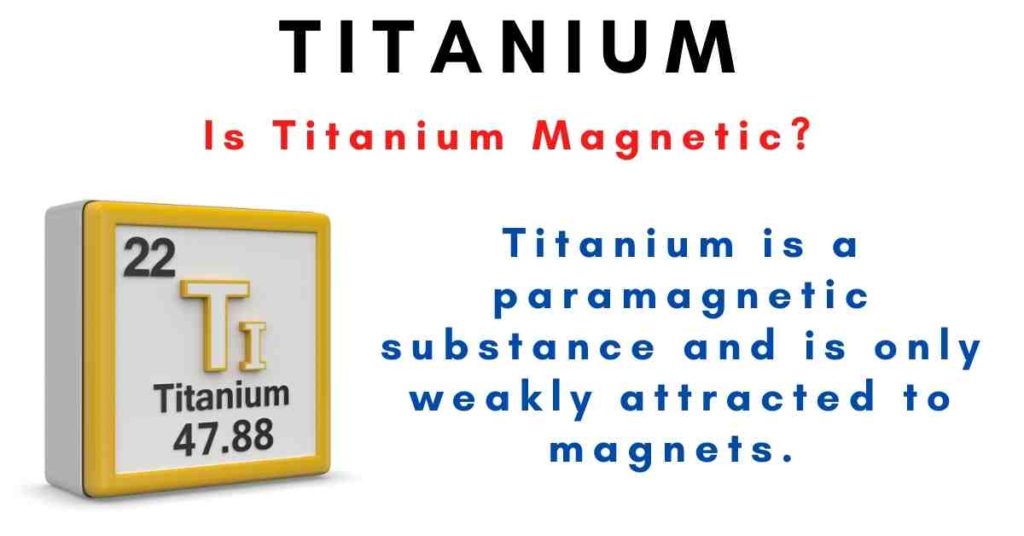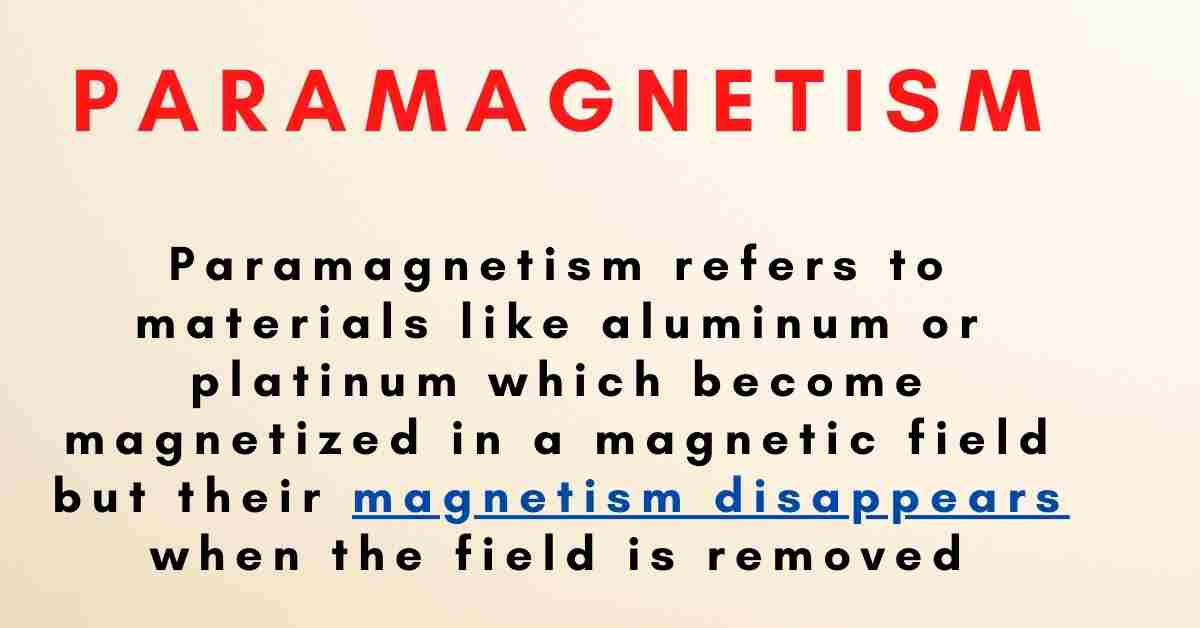Titanium, being a paramagnetic substance, is only weakly attracted to magnets. The presence of four unpaired electrons in its electrical structure is the primary cause of its paramagnetic characteristics. According to the National Center for Biotechnology Information, titanium is a paramagnetic (weakly magnetic) substance that is unaffected by the magnetic field of an MRI.
Please refer to the disclaimer at the end of the post before making any medical decision.
Keep reading to know the detailed answer to the question “is titanium magnetic?“

| Name of metal | Titanium |
| Melting point | 1668 °C |
| Density (solid-state) | 4.506 g/cm3 |
| Crystal structure | hexagonal close-packed |
| No of unbonded Electrons | 4 |
| Electronic configuration | [Ar] 3d2 4s2 |
Titanium is a metal known for its excellent strength-to-weight ratio. It’s a strong, low-density metal that’s ductile (particularly in an oxygen-free environment), glossy, and metallic-white in appearance. Titanium is non-magnetic in normal conditions and has poor heat and electrical conductors.
Table of Contents
Titanium Properties
- High tensile strength even at high temperatures
- Lightweight
- High corrosion resistance.
- ability to withstand extreme temperatures.
- Transition Metal
- The density is 4.54 g/cc.
- The melting point is 1933 K.
- Boiling Point is 3560 K.
- Atomic Radius is 147 pm
- The atomic Volume is 10.6 cc/mol.
- The Covalent Radius is 132 pm.
Paramagnetism
Some materials are weakly attracted by an externally applied magnetic field and produce internal, induced magnetic fields in the direction of the applied magnetic field, which is known as paramagnetism. Diamagnetic materials, on the other hand, are repelled by magnetic fields and produce induced magnetic fields in the opposite direction of the applied magnetic field.
Why Titanium is Important?
Some features of Titanium, such as high tensile strength, strong resistance to corrosion, and tolerance to high temperatures, have increased its relevance in many sectors such as aviation, spacecraft, and medical professions.
This metal is ideal for airplanes and spacecraft since it is 45 percent lighter than stainless steel and can endure repetitive strain, stress, and temperature.
Is Aluminum magnetic?
Aluminum (United States English), also known as Aluminum (British English), is not magnetic under normal conditions, owing to its crystal structure. Along with other metals like magnesium and lithium, it’s classified as a paramagnetic substance.
In other words, aluminum is not magnetic; nevertheless, in the presence of an external magnetic field, aluminum becomes “slightly” magnetic as its electron aligns with the magnetic field.
What color is Titanium?
Titanium is a naturally occurring element that has the color silver-greyish-white. Titanium is the hardest natural metal on the planet. It is three times stronger than steel and far stronger than gold, silver, and platinum while remaining incredibly light in weight. Check the full article “What color is a titanium”?
Summary
- The answer to the question “Is titanium magnetic?” is “no” (in normal conditions).
- Titanium is a paramagnetic substance.
- Paramagnetic substances are weakly attracted to magnets.
- Titanium is important due to its high tensile strength, strong resistance to corrosion, and tolerance to high temperatures.
More Interesting Topics
Is Aluminum Conductive?
Electron Configuration for Iron (Fe)
Silicon Valence Electrons
Magnetic Permeability
Thermal Conductivity of Water
How many valence electrons does iron have?
Frequently Asked Questions
1. Are titanium implants safe for magnetic resonance imaging examinations?
The magnetic field of an MRI has little effect on titanium, which is a paramagnetic substance. Implant-related problems are extremely rare, and MRI can be utilized safely in patients who have implants. However, the titanium plates utilized in the craniofacial area are alloys. Because the effects of MRI are dependent on the percentage of the alloy’s components, more study is needed [Reference]. Please consult your doctor before making any decisions.
2. Is gold magnetic?
Magnetic fields do not attract pure gold, but if a large magnetic field is given to it, the gold will move somewhat before repelling it. However, because this is so little, it cannot be detected using magnets.
3. What metals are magnetic?
Iron, nickel, cobalt, and rare earth metal alloys are the most common metals used for permanent magnets.
4. Does titanium rust?
While titanium is strong, resilient, and resistant to rust and corrosion in severe environments, it is nevertheless prone to tarnishing and requires frequent, though minor cleaning and maintenance. A specific metal polisher with oxidation removal capabilities is ideal for scratched or tarnished titanium.
5. Is tungsten magnetic?
Because of the presence of unpaired electrons and the realignment of those electron pathways due to an external magnetic field, tungsten is partly magnetic or paramagnetic in nature.
6. What is the melting point of titanium?
Titanium is known for its excellent strength-to-weight ratio as a metal. It’s valuable as a refractory metal because of its comparatively high melting point (more than 1,650 °C or 3,000 °F).
7. What is magnetic permeability?
The resistance of a material to a magnetic field, or the amount to which a magnetic field may permeate through a substance, is measured by magnetic permeability.
8. What’s the molar mass of Aluminum?
Aluminum molar mass is 26.982 g/mol.
Conclusion
This article focuses on the question ” is titanium magnetic?”
Titanium is a paramagnetic material. Its magnetic properties depend upon its electronic configuration. Although paramagnetic, its strength is so low that it can be easily misread, making it ideal for many biomedical implants. Also, Titanium is immune to the magnetic fields of MRI, which is a huge comfort for patients with titanium implants.
More Links
Combustion Reactions
Sublimation Examples| Process & Case Study
Distillation| Principles, and Processes
Hydrogen Molar Mass
Hydrogen Ion | Definition, Charge & Formula
Is Hydrogen a Metal?
is b2 paramagnetic or diamagnetic?
Disclaimer
This content, including advice, is intended to give only general information. It is not a substitute for professional medical advice.
Whatsinsight.org‘s blog and everything published on it are provided solely as an information resource. The blog, its authors, and affiliates accept no responsibility for any accident, injury, or damage caused by following the information on this website, in part or whole. We do not recommend using any material or chemical without first consulting the manufacturer’s Material Safety Data Sheet and following the safety advice and precautions on the product label.
- BCl3 Lewis Structure in four simple steps - November 1, 2023
- PH3 Lewis Structure in four simple steps - October 8, 2023
- PF3 Lewis structure in four simple steps - September 24, 2023



